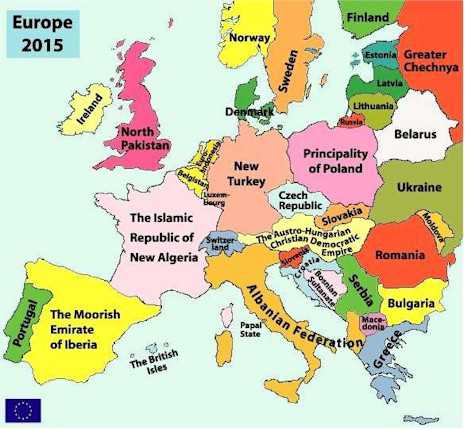By Shada Islam
HAVING agreed to the last-minute cancellation of his self-declared ‘International Burn a Quran Day’, Pastor Terry Jones of Florida has thankfully disappeared from the headlines, his hate-filled Islamophobic diatribes no longer dominating the headlines or poisoning the airwaves.
It would be a mistake to cry victory over madness, however. Even as Pastor Jones fades from the news, a string of Islam-hating European politicians appear to be taking his place, seemingly competing with each other to make the most outlandish and outrageous claims against Muslims and Islam.
After gains made this year by far-right parties in Belgium and the Netherlands, Sweden’s anti-immigration Sweden Democrats party passed the electoral threshold for the first time in the recent elections and won 20 seats in parliament.
The centre-right coalition of Swedish Prime Minister Fredrik Reinfeldt and the left-wing opposition are refusing – at least so far – to work with the Sweden Democrats, hoping to avoid a scenario similar to the one in the Netherlands where Geert Wilders’ Freedom Party dominates the political landscape and could end up in a coalition government — if one is ever formed by that country’s bickering politicians.
Like his far-right counterparts in other European countries, Sweden Democrats’ leader Jimmie Åkesson has a simple agenda: ending immigration, being tough on Muslims and demanding a much stricter integration policy. The Swedish politician could be the clone of his Dutch counterpart Wilders who has become an inflammatory critic of Islam by advocating a ban on the Quran, taxing women who wear headscarves, banning the construction of new mosques and ending all immigration to the Netherlands from Muslim countries.
As the xenophobic parties become shriller, Europe’s mainstream parties are slowly but surely adopting some of the extremist rhetoric and “get-tough on Islam” messages of the far-right. At an EU summit in Brussels last week, French President Nicolas Sarkozy was loudly criticised by his colleagues for his tough clampdown on Roma or gypsies. But in fact, many European countries are engaged in similar – but less publicised – schemes to send the Roma back to their countries of origin, including Romania and Bulgaria.
France will also soon ban the burka, a move likely to be followed by several other countries in Europe, including Belgium. Switzerland has banned the construction of minarets while shops and restaurants selling halal meat are often derided as having “sold out” to Muslims.
In Germany meanwhile, Thilo Sarrazin, a former economist with the Bundesbank, has stirred acrimonious controversy with his book, Deutschland schafft sich ab or ‘Germany does away with itself’. Mr Sarrazin argues among other things that the right sort of German women are having too few babies and that the wrong sort – Muslims and those with little education – are having too many. The result is that not only Germany’s population is shrinking, it is also getting dumber.
The anti-Islam rants in America and Europe may appear similar but there are differences.
While the focus in America appears to be on Muslims as would-be terrorists and a security threat, the debate in Europe is dominated more by a discussion of identity: whether Muslims, with their conservative values and ‘foreign’ customs, can ever be truly integrated as full-fledged European citizens.
Europe’s anti-immigrant, anti-Muslim debate has an unpleasant racist undercurrent, which is often denounced by European Jewish leaders as an ugly reminder of the continent’s past. Economic uncertainty, fears for Europe’s future, concerns about globalisation and Europe’s place in the new world order are also fuelling the anti-Muslim discourse.
Lost in this hysteria is any reference to the reality of European Muslims’ lives and their very real integration into the mainstream economic and political life of their country.
One reason for the lopsided discourse is that while the hate-mongers become ever more strident and outrageous in their comments, the voices of reason on immigration and Muslims remain strangely silent. I have yet to hear a European politician tell the real truth about Muslims and immigrants’ contribution to their country’s economy, culture or history. Business leaders may sometimes point out – timidly – that ageing and skills-deficient Europe needs foreign labour, but their arguments are lost in transmission. In all honesty, too, intelligent and reasonable Muslim voices are also heard much too seldom. Some European media, meanwhile, generate more hostility among communities by seeking out extremist opinion within European Muslims.
The rise of the far-right is having an impact on Europe’s global standing, especially in the Muslim world. Indonesia’s ambassador to the Netherlands, Yunus Effendi Habibie, said in a recent interview that the planned October visit by Indonesia’s President Susilo Bambang Yudhoyono would be “very much in doubt” if Wilders is part of the next coalition government.
“Of course the president will not come here if there is someone in the cabinet who says Islam is backward. I do not want my president to be seen as a clown,” the ambassador told the paper. He went on to say that the relationship between the Netherlands and its former colony would be hurt if Wilders joins the government. Turkey’s bid to join the EU has also fallen victim to anti-Islamic sentiments. European Union Commission President Jose Manuel Barroso noted recently that Turkey’s ambitions to join the bloc are being thwarted because of “cultural differences” and a change in attitude toward Turkey.
It’s no secret: when EU politicians talk about differences in cultures and values, what they really mean is that Turkey is a Muslim country, albeit one with a secular constitution.
The writer is Dawn’s correspondent in Brussels.


Leave a Reply